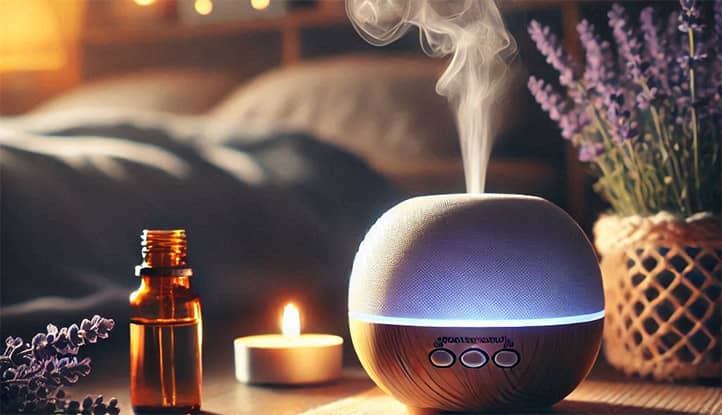Smells are an inseparable part of our daily lives, forming an invisible yet powerful connection between the external world and our inner state. Morning coffee fills the kitchen with coziness, the scent of freshly cut grass brings back childhood memories, and the gentle aroma of flowers reminds us of romantic moments. These olfactory impressions often have a profound emotional impact, capable of evoking feelings of joy, tranquility, or even sadness.
The perception of smells is not just a physiological reaction but also a psychological process connected to our memory and emotions. Science explains that smells activate the brain’s limbic system, responsible for emotions, mood, and even behavior. That’s why a familiar scent can instantly trigger a wave of memories or influence our well-being.
In recent years, aromatherapy as a therapeutic practice has gained significant popularity among those seeking alternative or complementary methods of maintaining mental health. This growing interest stems not only from its appeal due to naturalness and accessibility but also from scientific studies confirming its effectiveness.
In many cultures, aromatherapy has deep historical roots. The ancient Egyptians used aromatic resins for purification rituals, and in Chinese medicine, essential oils were used to harmonize the body’s energy. Today, this practice has reached new levels of recognition, thanks to studies demonstrating its effects on reducing stress, improving sleep, and uplifting mood.
Modern psychology views aromatherapy as an additional method for addressing anxiety, depression, and emotional exhaustion. Specialists recommend using essential oils to create a favorable environment at home or work, fostering a sense of safety and comfort.
Aromatherapy is also becoming a part of the wellness industry as people seek to integrate healing scents into their lives through candles, diffusers, aromatherapy massages, and even cosmetic products. Scents are no longer perceived merely as a pleasant addition—they are becoming tools for working with emotions, stress, and inner harmony.
In this context, the magic of scents finds its new place in a world where caring for mental health takes center stage.
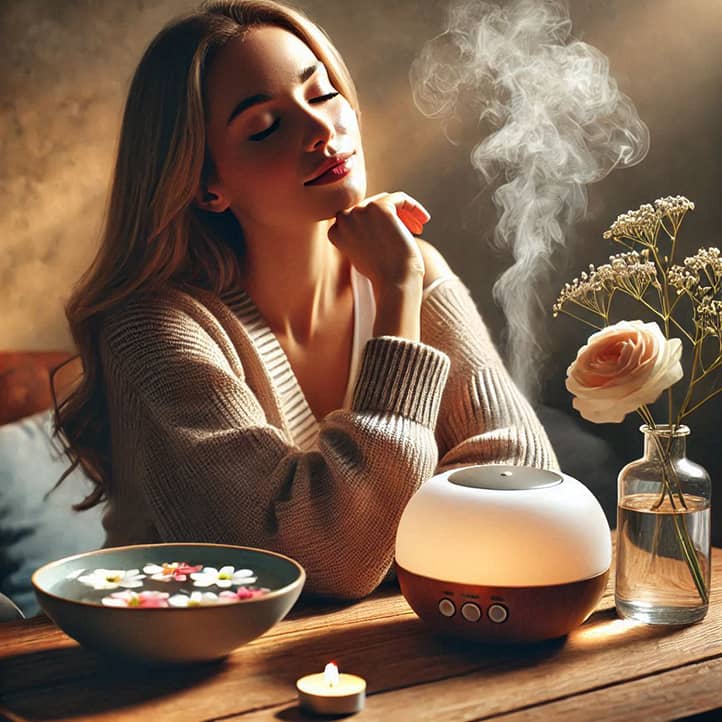
What is Aromatherapy?
Aromatherapy is a therapeutic method that uses natural scents, primarily essential oils, to improve a person’s physical and mental state. It combines the properties of aromatic substances with their effects on the body through smell and skin receptors. This method is based on the interaction of scents with brain structures that control emotions, mood, and behavior.
In the modern world, aromatherapy finds application both in professional medicine and home practices. It not only helps relieve tension and restore balance but also promotes emotional harmony, reduces anxiety, and enhances quality of life. Natural aromas have become a powerful tool in combating modern challenges such as stress, emotional burnout and depression.
Definition and Historical Development
Aromatherapy dates back to ancient times when people first began using aromatic substances for rituals, healing, and spiritual practices. Its history spans thousands of years and encompasses the traditions of many cultures.
- Ancient Egypt. The Egyptians were the first to use essential oils in the form of incense, ointments, and balms for religious and medical purposes. For instance, frankincense and myrrh were used as antiseptics and for maintaining spiritual purification.
- China and India. In Chinese medicine, aromatic herbs were part of practices for harmonizing the Qi energy, while Ayurveda utilized scents to heal both body and spirit.
- Ancient Greece and Rome. Greek physician Hippocrates described the therapeutic properties of aromatic plants, and the Romans actively used them to create a relaxing atmosphere in their baths.
During the Middle Ages, aromatherapy somewhat lost its popularity. However, its revival in the 20th century is linked to the work of French chemist René-Maurice Gattefossé, who first systematized knowledge about essential oils and introduced the term “aromatherapy.”
Today, aromatherapy merges the traditions of ancient civilizations with modern scientific approaches, expanding its range of applications.
Basic Principles of Aromatherapy
Aromatherapy influences the body through the powerful effects of scents on the olfactory and nervous systems. Its main principles include:
- Impact on the limbic system. When aromatic molecules enter the nose, they activate olfactory receptors that send signals to the brain’s limbic system. This area is responsible for emotions, memory, and behavioral responses. For example, the scent of lavender reduces cortisol levels (the stress hormone) and induces a sense of calm.
- Stimulation of physiological processes. Essential oils, whether inhaled or applied to the skin, affect circulation, respiratory, and immune systems. For instance, eucalyptus oil facilitates breathing, while peppermint alleviates muscle tension.
- Individual reaction to scents. Each person perceives scents differently, depending on personal experience, memories, and cultural context. What is calming for one person might cause discomfort for another.
- Combination of physical and emotional effects. Aromatherapy works not only on the physical level but also helps restore emotional balance. For example, citrus scents boost energy and optimism, while woody aromas enhance concentration.
These principles ensure the versatility of aromatherapy, which helps not only with healing but also with improving quality of life, creating a harmonious connection between the body, mind, and the surrounding environment.
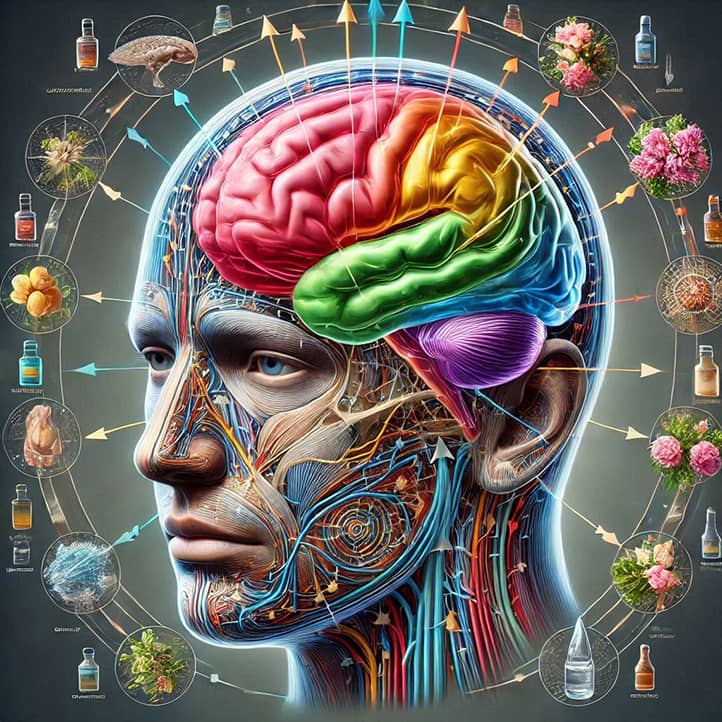
Scientific Basis of Aromatherapy
Aromatherapy, while rooted in ancient history, relies on modern scientific research that confirms its impact on the brain and emotional state. The role of scents in human life extends beyond mere pleasant sensations — aromas can activate complex neurophysiological mechanisms that help harmonize mental well-being.
Scents affect the brain through olfactory receptors, which serve as a direct “communication channel” to the limbic system responsible for emotions, memory, and certain physiological responses. This makes aromatherapy a powerful tool in addressing anxiety, stress, and other emotional disorders. Researchers continue to explore how different aromas influence the brain and body, with studies affirming its effectiveness in supporting psychological health.
How Scents Affect the Brain: The Role of Olfactory Receptors
Olfactory receptors play a key role in linking the external world to the brain. When aromatic molecules enter the nose, they bind to receptors in the olfactory epithelium located at the upper part of the nasal cavity. These receptors, much like antennas, recognize the chemical structure of molecules and transmit electrical impulses to the olfactory bulb in the brain.
- The olfactory bulb acts as a “distribution center,” analyzing signals and sending them to the limbic system, including the amygdala and hippocampus. These structures regulate emotional reactions, memory, and mood. As a result, scents can trigger instant emotional responses, such as calmness or excitement, even without conscious analysis.
- Unique receptor activation: Scientists have found that each scent activates a distinct set of receptors, explaining the diversity of reactions to aromas. For example, lavender stimulates receptors that reduce stress levels, while mint activates centers linked to alertness.
Effects of Aromas on Emotional State via the Limbic System
The limbic system is the brain’s primary “emotional center,” and its activity is directly influenced by signals received through smell.
- Calming effect: Studies show that lavender essential oil reduces amygdala activity, promoting lower anxiety and better sleep.
- Mood enhancement: Citrus scents, such as lemon or orange, stimulate serotonin release, known as the “happiness hormone,” which helps combat depression.
- Energizing impact: Mint and rosemary scents improve focus, reduce fatigue, and stimulate cognitive processes.
These effects are confirmed by experiments in which participants exposed to specific scents reported decreased stress levels and improved cognitive performance.
Research Supporting the Effectiveness of Aromatherapy
Scientific experiments and clinical trials increasingly validate the efficacy of aromatherapy in various aspects of psychological health.
- Stress reduction: Research published in the Journal of Advanced Nursing showed that patients who inhaled lavender essential oil during procedures experienced significant reductions in anxiety and pain.
- Improved sleep: A Japanese study found that using lavender scents before bed lowers cortisol levels and promotes faster sleep onset.
- Cognitive functions: British scientists discovered that rosemary scent improves memory and concentration, particularly beneficial for students and professionals requiring high focus.
Thus, aromatherapy is not only a pleasant practice but also grounded in neuroscience and psychology, making it a valuable tool in modern therapeutic practices.
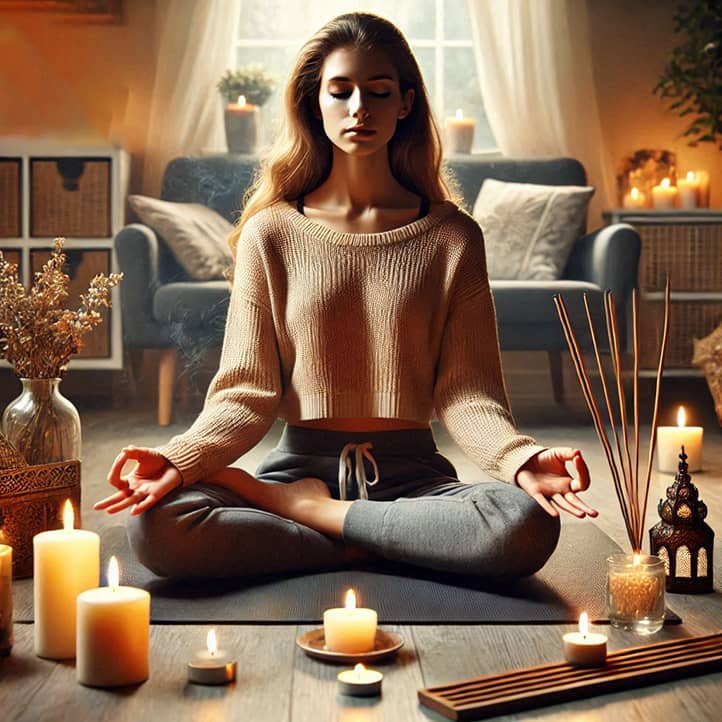
Aromatherapy in Combating Psychological Challenges
The fast pace of modern life often leads to stress, anxiety, sleep problems and even depression. In these conditions, finding natural and effective methods to enhance mental well-being is more relevant than ever. Aromatherapy, based on the use of essential oils, offers a safe and accessible way to help address emotional and psychological disorders.
Research confirms that aromas not only relieve tension but also stimulate the production of “happiness hormones,” harmonize the nervous system, and even reduce symptoms of chronic fatigue.
Relieving Stress and Anxiety with Aromas
Stress and anxiety are among the most common issues today. Essential oils, thanks to their ability to influence the brain’s limbic system, help reduce tension and induce relaxation.
- Lavender: Known as one of the most effective stress-relievers, it has a calming effect, lowers cortisol levels, and stimulates serotonin production. A study at Kyoto University found that lavender scent reduces heart rate and blood pressure in individuals experiencing high stress.
- Bergamot: Renowned for its ability to alleviate anxiety, bergamot stimulates dopamine release, helping to create a sense of emotional ease. Participants in studies who inhaled bergamot oil reported significant anxiety reduction after just 15 minutes of exposure.
- Ylang-ylang: Helps relieve physical tension by relaxing muscles and creating an atmosphere of calm.
Practical applications include using diffusers, aromatic candles, or applying oils to wrists or the neck for immediate effects.
Improving Sleep Quality
Insomnia or shallow sleep often results from stress or overwork. Aromatherapy offers a natural way to enhance sleep quality without side effects.
- Lavender: Considered the “gold standard” for fighting insomnia, lavender calms the nervous system and prolongs deep sleep phases. Research at the University of Southampton demonstrated that lavender use in the bedroom significantly improves sleep duration and quality.
- Chamomile: Contains apigenin, a chemical compound with a calming effect on the brain, particularly helpful for those who struggle to sleep due to emotional agitation. Inhaling chamomile scent or using it in baths aids faster sleep.
- Sandalwood: Promotes relaxation with its deep aroma, reducing breathing and heart rates.
Practical methods include adding a few drops of essential oil to a sprayer, an aromatherapy diffuser, or even directly onto a pillow before sleep.
Assistance with Depression and Emotional Burnout
Depression and emotional burnout require a comprehensive approach, but scents can serve as an important supplementary tool in managing these conditions.
- Citrus oils: Lemon, orange, and grapefruit stimulate serotonin and dopamine release, helping to improve mood. Experimental studies showed that individuals regularly exposed to these scents experienced reduced symptoms of depression within a week.
- Rosemary: Known for its stimulating effect on brain activity, rosemary helps combat lethargy, enhances focus, and boosts energy.
- Jasmine: With its rich aroma, jasmine improves mood and reduces symptoms of anxiety and depression.
Aromatherapy in these cases is often combined with relaxation practices such as meditation or yoga. Applying oils to the skin, inhaling them through a diffuser, or taking aromatic baths allows for maximum effectiveness.
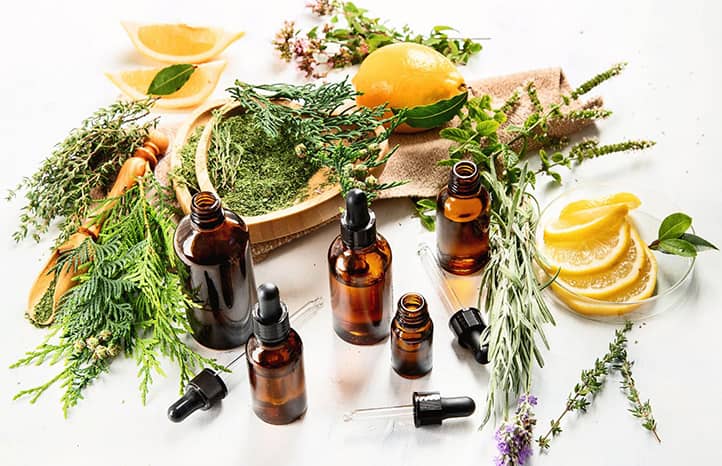
Popular Essential Oils and Their Psychological Effects
Essential oils, with their natural properties, have long been an indispensable tool in aromatherapy. Not only do they smell pleasant, but they also uniquely influence emotional states, reduce stress, improve mood, and even boost energy levels. Each aroma has distinct features and is used depending on a person’s needs.
In addition to individual use, essential oils can be combined to create unique blends that work synergistically. Such combinations provide the most positive effects on mental health and mood.
Lavender, Rosemary, and Peppermint: When and How to Use Them
Lavender is known for its calming and relaxing properties. Its aroma reduces anxiety, calms the nervous system, and improves sleep quality.
Recommendations:
- Use in a diffuser before bedtime for relaxation.
- Add a few drops to a bath to unwind after a hard day.
- Apply a drop to your wrist or neck for quick calming in stressful situations.
Rosemary stimulates mental activity, enhances concentration, and improves memory. Its aroma is suitable for work or study, helping to stay focused and active.
Recommendations:
- Use in a work environment or while preparing for exams.
- Inhale the aroma before important meetings to boost mental clarity.
- Add to massage oil for recovery after physical exertion.
Peppermint refreshes, stimulates, and helps combat fatigue. It also relieves headaches and increases overall tone.
Recommendations:
- Apply a drop of oil to temples or the back of the head to ease headaches.
- Use in a diffuser in the morning to energize.
- Add a few drops to a bowl of hot water for inhalation during colds or fatigue.
Citrus Aromas for Mood Enhancement
Citrus essential oils such as lemon, orange, grapefruit, and mandarin are powerful natural antidepressants. Their aromas bring a sense of freshness, lightness, and joy.
Lemon reduces stress and anxiety, stimulates brain function, and is used for an optimistic mood.
Recommendations:
- Add to water to create a refreshing room spray.
- Use in the office for an energetic atmosphere.
Orange improves mood, reduces fatigue, and stimulates a sense of joy.
Recommendations:
- Use in the morning in the shower by adding a drop to your shower gel.
- Inhale the aroma during moments of sadness or emotional burnout.
Grapefruit tones and boosts energy. It works well when combined with other citrus oils.
Recommendations:
- Add a few drops to body lotion to create a light, refreshing aroma.
Specific Blends for Different Emotional States
Combining essential oils allows for more complex aromas that influence various aspects of mental well-being.
- For relaxation: Lavender + Chamomile + Sandalwood. This combination helps calm down after a stressful day, reduce anxiety, and promote deep sleep.
- For energy boost: Lemon + Peppermint + Rosemary. This blend provides a burst of energy, stimulates brain activity, and reduces fatigue.
- For harmony: Orange + Ylang-Ylang + Lavender. Ideal for creating an atmosphere of joy and tranquility, helping to set a positive mood.
Practical Tips:
- Use diffusers to fill the room with a pleasant aroma.
- Apply blends to the skin, diluting them with a carrier oil (e.g., coconut or almond oil).
- Create aromatic sprays for pillows or clothing.
Popular essential oils offer a wide range of possibilities for improving your psychological state. They can be used individually or in combinations, depending on your mood or need. Thanks to simple methods of application, aromatherapy becomes accessible even to beginners, and its effects can change everyday life for the better.
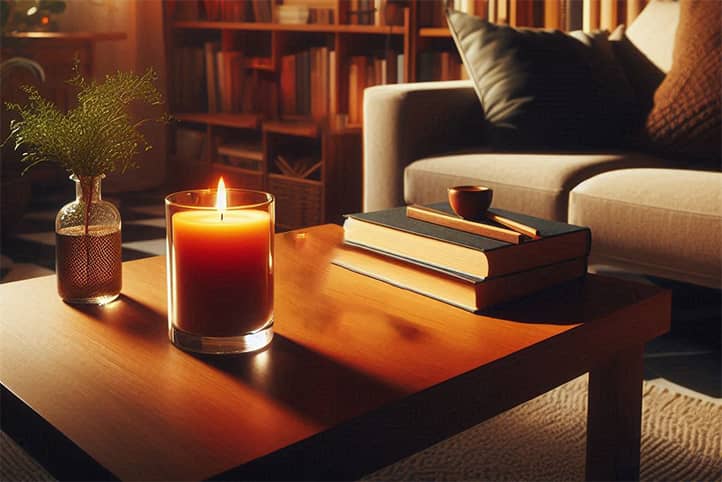
Practical Application of Aromatherapy
Aromatherapy has become a popular method for supporting emotional and physical well-being, easily integrated into daily life. It helps create a calming atmosphere, restore energy, overcome stress, or improve focus. Thanks to the accessibility of essential oils and the simplicity of their use, aromatherapy can be your personal tool for enhancing psychological health.
It is essential to note that the effectiveness of aromatherapy depends on the correct choice of oils, application techniques, and adherence to safety measures. Incorrect use can not only reduce the expected effect but also harm your health.
How to Use Aromatherapy at Home: Methods and Techniques
Using aromatherapy at home is simple and convenient, allowing you to tailor it to your needs for relaxation, focus, or mood improvement.
Aroma diffusers are one of the most common methods. They disperse essential oils as a fine mist, filling the room with fragrance.
How to use:
- Add a few drops of your chosen essential oil to the diffuser water.
- Use lavender or ylang-ylang for relaxation, citrus oils for energy.
- Do not leave the diffuser on for more than 30-60 minutes at a time to avoid scent saturation.
Aromatic candles and lamps are ideal for creating a cozy atmosphere. These methods heat the oil, diffusing its aroma throughout the space.
How to use:
- Pour a few drops of essential oil into the lamp’s bowl with water and light a candle underneath.
- Use candles with natural fragrances suited to your needs.
Massage with Oils. Essential oils are mixed with carrier oils, such as coconut or almond, and used for massage, combining relaxation with skin benefits.
How to use:
- Add 5–10 drops of essential oil to 10 ml of carrier oil.
- Use to relieve muscle tension or promote relaxation.
Aromatic baths are one of the most pleasant ways to use aromatherapy. A bath with essential oils promotes relaxation and energy recovery.
How to use:
- Add 10–15 drops of essential oil to warm bathwater, first diluting it in milk or honey for even dispersion.
- Use scents like lavender, chamomile, or sandalwood.
Aromatherapy in Professional Therapeutic Practice
In professional therapy, aromatherapy is used as a complement to other methods, such as massage, psychotherapy, or yoga. It helps create a favorable environment for patient recovery.
In Psychotherapy aromatherapy reduces anxiety during consultations. For instance, using a diffuser in a therapist’s office helps the client relax.
Example:
- Lavender for calming the nervous system.
- Citrus aromas for activating mental processes.
In Spa Centers essential oils are added to treatments such as massages or saunas, helping clients relieve tension and maximize the effect of the session.
Example:
- Eucalyptus oil for easing breathing.
- Rose aroma for a luxurious and harmonious experience.
In Rehabilitation. Some medical centers use aromas to reduce patient anxiety before surgeries or assist in recovery after stressful events.
Safety Precautions: When Aromatherapy Can Be Harmful
Although aromatherapy appears safe, improper use may lead to negative consequences.
Allergic Reactions. Essential oils can cause skin irritation or allergic reactions.
Recommendations:
- Always perform a sensitivity test: apply a drop of diluted oil to the elbow crease and wait 24 hours.
- Avoid direct contact between undiluted oils and the skin.
Contraindications for Pregnant Women and Children. Certain oils, such as rosemary or thyme, can be harmful to pregnant women or young children.
Recommendations:
- Consult a doctor before using aromatherapy in such cases.
Overuse. Excessive scents may cause headaches or even dizziness.
Recommendations:
- Follow the dosages specified in recipes.
- Avoid prolonged use of aromas without breaks.
Aromatherapy is a versatile method easily adaptable for home use and professional practice. The key is to follow safety rules, choose high-quality oils, and apply them correctly. This approach allows you to fully unlock the benefits of aromatherapy, supporting your emotional and physical well-being.
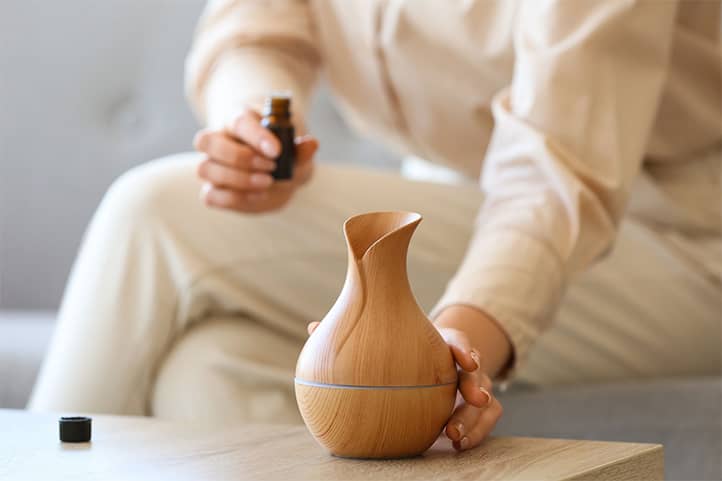
Aromatherapy in Modern Psychology
Aromatherapy is increasingly integrated into modern psychological practice as a powerful supplementary tool for supporting emotional well-being. The unique ability of scents to influence the brain and evoke specific associations opens new horizons for their use in psychotherapy. Aromatherapy not only helps reduce stress or improve mood but also supports work on deeper psychological issues.
The use of aromatherapy in psychology is based on its ability to activate the limbic system, responsible for emotions and memories. Thus, scents can enhance the effectiveness of therapeutic methods, facilitating the process of working with clients.
The Role of Aromatherapy in Comprehensive Therapy
In psychology, aromatherapy is often used as part of a comprehensive approach to treatment. This means it is applied alongside other methods such as cognitive-behavioral therapy, psychodynamic therapy, or art therapy.
- Emotional Support. Aromatherapy helps create a comfortable atmosphere that reduces anxiety and fosters trust between the client and psychologist. For example, the scent of lavender or ylang-ylang can calm a client feeling fear or discomfort before a session.
- Enhancing the Therapeutic Effect. Certain essential oils can stimulate cognitive processes, such as memory or concentration. This is especially useful when working with clients who struggle with focus or are overwhelmed by stress. Example: During therapy with a client experiencing chronic stress, using citrus scents can boost energy and create a positive mood.
- Supplementing Relaxation Techniques. In practices aimed at relaxation (meditation, breathing exercises), scents such as sandalwood or chamomile enhance the feeling of calm and inner balance.
The Use of Scents in Psychotherapy Sessions
Aromatherapy can be directly incorporated into the structure of a psychotherapy session, amplifying the results of working on emotional and behavioral issues.
- Preparation for the Session. Before starting work with a client, a diffuser with essential oils can be placed in the therapist’s office. This creates a favorable atmosphere and sets the client up for the session. Example: The scent of lavender or bergamot can help a client relax, which is crucial when dealing with anxiety or fears.
- Creating Associations to Reinforce Results. Scents can evoke strong emotional associations. The therapist may suggest that the client use a specific scent in daily life to reinforce positive experiences gained during sessions. Example: If a client felt a sense of calm during therapy with lavender, the therapist might recommend its use at home to recreate this state.
- Working with Traumatic Memories. The limbic system, activated by scents, is also linked to memory. Aromas can assist in working with traumatic memories by creating a sense of safety.
- Supporting Children in Therapy. Aromatherapy is especially useful when working with children, as scents can evoke positive emotions and curiosity. A child may more easily engage in the therapeutic process in a room filled with pleasant aromas like vanilla or mint.
The integration of aromatherapy into modern psychological practice allows you to combine scientific methods with natural resources that have a positive effect on a person’s emotional state. The use of aromas in complex therapy and psychotherapy sessions allows you to create comfortable conditions, maintain emotional balance and stimulate self-healing processes. Due to its accessibility and versatility, aromatherapy is becoming an important tool in the work of modern psychologists.
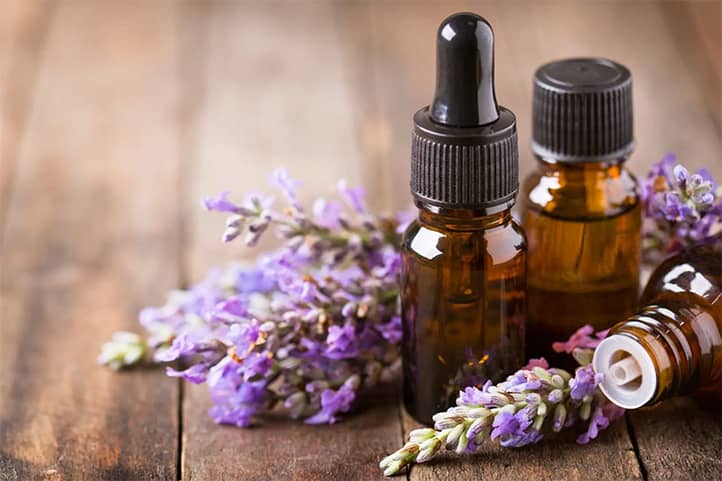
Conclusion
Aromatherapy unveils unique opportunities for supporting and improving mental health. Its main advantages are safety and naturalness, making this approach accessible and acceptable to many people. Properly used essential oils can relieve stress, improve mood, promote quality sleep, and even assist in combating depression or emotional burnout. This therapy does not require significant financial investments and can easily integrate into daily life, offering a way to restore harmony through simple scents.
Scientific research continually confirms the effectiveness of aromatherapy, contributing to its growing popularity. With the ability to activate the limbic system, scents become a tool not just for relaxation but also for focused emotional work. Future developments in the science of aromas promise new discoveries, such as creating specialized combinations of essential oils for specific mental states or developing innovative methods of using them in therapy.
Modern aromatherapy is not just a way to restore inner balance but also an important direction in the field of psychological well-being. The combination of the natural power of scents and scientific achievements allows a deeper understanding of how aromas can alter our emotional state, help overcome challenges, and promote harmony. Scents become an invisible guide, helping us feel better, understand our emotions more deeply, and live more mindfully.
